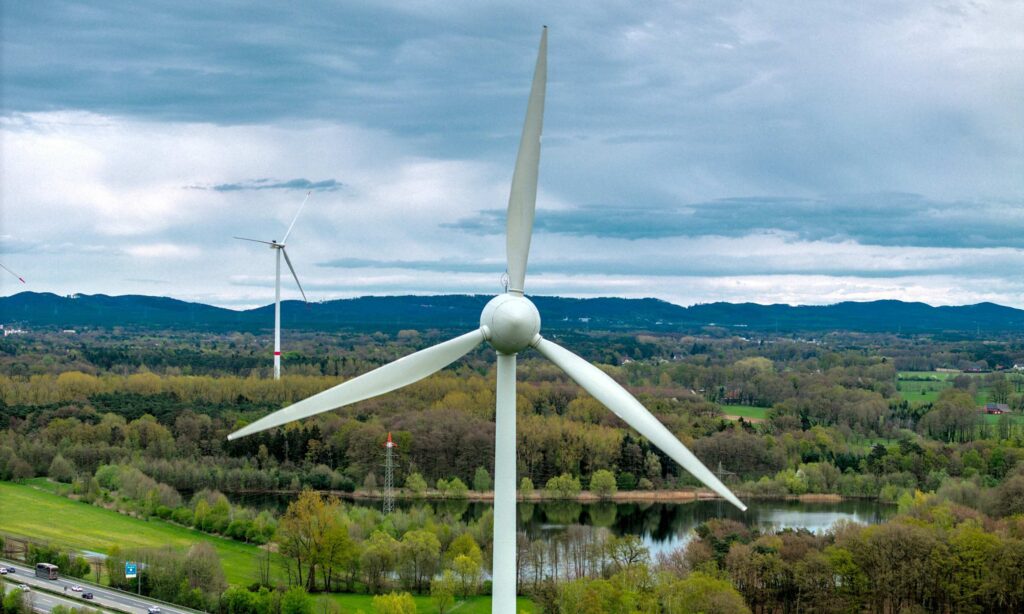
Renewables are essential to the economy because corporations are now demanding green power as a condition of setting up shop in Canada. (Photo: Eugene J via Unsplash)
In December, the Government of Canada finalized its clean electricity regulations. These will significantly clean up the country’s electricity grid by phasing out fossil fuels and creating more opportunities for renewable sources of power, including solar and wind.
The case for renewable electricity has never been stronger.
Renewables are certainly a climate solution, helping us to dramatically reduce our reliance on gas, oil and coal.
But it’s increasingly clear that renewables also make a lot of sense from an economic point of view. In fact, one of the strongest arguments for expanding wind, solar and energy storage is that they’re low-cost, can lower household energy bills and are good for business.
As the federal government makes clear, “Wind energy and solar PV are the fastest growing sources of electricity in Canada. Cumulative installed capacity for solar PV has grown from 26 megawatts (MW) in 2007 to 6,452 MW in 2022, and for wind power has increased from 1,846 MW in 2007 to 15,132 MW in 2022.” These are staggering increases and attest to the fact that Canada has superb wind and solar resources.
Predictions for the rest of the decade are encouraging as well. The International Energy Agency says our country will likely add more than 25 GW of renewable capacity between 2024 and 2030, “more than double the growth of the previous six years.”
Renewables’ expansion is dramatic worldwide. The IEA’s “World Energy Outlook” says, “Clean energy is entering the energy system at an unprecedented rate. … Investment flows to clean energy projects are approaching USD 2 trillion each year, almost double the combined amount spent on new oil, gas and coal supply.”
Renewables’ expansion is dramatic worldwide. The IEA’s “World Energy Outlook” says, “Clean energy is entering the energy system at an unprecedented rate. … Investment flows to clean energy projects are approaching USD 2 trillion each year, almost double the combined amount spent on new oil, gas and coal supply.”
Especially impressive is the increase in power from the sun: Over the past five years, annual solar capacity additions have quadrupled globally.
And a recent RBC report says that, by 2035, renewables will expand at five times the rate of conventional energy. The IEA concludes, “Continued growth in global energy demand post-2030 can be met solely with clean energy.”
RBC says one reason for this massive renewables buildout is their attractive price. Globally, “between 2010 and 2020, the cost of solar and wind power fell 56% and 85%, respectively.” The Pembina Institute says that, in most markets, sun and wind currently provide the most cost-effective electricity.
And the IEA believes renewables’ low cost will continue into the future: “[C]lean technologies that are increasingly cost-effective today are set to remain so…”
Renewables are essential to the economy because corporations are now demanding green power as a condition of setting up shop in Canada.
The think tank Clean Energy Canada says, “Clean electricity is … key for powering growing industries like EV manufacturing, data centres and clean steel production, with companies prioritizing or requiring clean power for their operations.” If we want to win new investment in the competitive North American market, “doubling down on non-emitting electricity” is crucial.
A report from Clean Energy Canada says there will be 700,000 more energy jobs in 2050, with growth in clean energy positions far outpacing those in the declining fossil fuel sector.
The move to clean electricity — and away from fossil fuels — is also a significant job creator. A report from Clean Energy Canada says there will be 700,000 more energy jobs in 2050, with growth in clean energy positions far outpacing those in the declining fossil fuel sector.
Ultimately, we know renewables make good business sense because they’re helping to power some of the planet’s most successful economies. Germany — the third largest economy in the world — now gets 45 per cent of its electricity from solar and wind; almost half of the Netherlands’ power comes from renewables. Denmark relies on sun and wind for about 67 per cent.
If Canada wants to be a member of this impressive club, it needs to take decisive action — including rapid rollout of the clean electricity regulations. Otherwise, we’ll be denied the many economic benefits that renewables so richly provide.
This article was originally published as an Op-Ed in The Hamilton Spectator.
Related projects
Always grounded in sound evidence, the David Suzuki Foundation empowers people to take action in their communities on the environmental challenges we collectively face.



